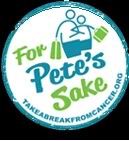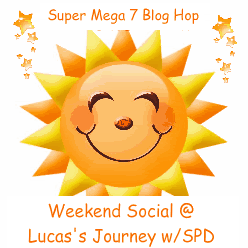I haven't posted about Lucas in a few day. I've been busy doing our reviews and we went to the shore over the weekend.
Last year around Christmas time I won an overnight stay at Harrah's casino in Atlantic City. I was really nervous to use it because I was afraid of how Lucas would behave with all of the noises. Not to mention it just isn't a family friendly place! We'll the free night certificate was going to expire so we decided to use it. It was only one night.
Again, Lucas baffles us and my fears were completely wrong! He was a complete angel! He was so well behaved, jovial, just an all around pleasant little man to be around.
Right before we were leaving we took my older son Charlie up to use his tokens at the fun center. The pool was located right outside of that and then you can go onto the roof where they had outside games that the kids could play. Lucas was walking along and out of no where started saying "Off, Off, Off"! My husband started screaming at me and said "LOOK DOWN!" He was reading the words off, off, off, that they had on the shuffle board mat. He always seems to surprise us with things that he knows.
When I was talking with his therapists this week about what happened they seemed to pass the word Hyperlexia around so I looked into it.
Borrowed from http://en.wikipedia.org/wiki/Hyperlexia
Hyperlexic children are characterized by having average or above average IQs and word-reading ability well above what would be expected given their ages and IQs. It can be viewed as a superability in which word recognition ability goes far above expected levels of skill. Some hyperlexics, however, have trouble understanding speech. Most or perhaps all children with hyperlexia lie on the autism spectrum. Between 5-10% of autistic children have been estimated to be hyperlexic.
Hyperlexic children are often fascinated by letters or numbers. They are extremely good at decoding language and thus often become very early readers. Some hyperlexic children learn to spell long words (such as elephant) before they are two years old and learn to read whole sentences before they turn three. An fMRI study of a single child showed that hyperlexia may be the neurological opposite of dyslexia. Whereas dyslexic children usually have poor word decoding abilities but average or above average reading comprehension skills, hyperlexic children excel at word decoding but often have poor reading comprehension abilities.
Hyperlexia was first named and scientifically described in 1967.
Developmental
Despite hyperlexic children's precocious reading ability, they may struggle to communicate. Often, hyperlexic children will have a precocious ability to read but will learn to speak only by rote and heavy repetition, and may also have difficulty learning the rules of language from examples or from trial and error, which may result in social problems. Their language may develop using echolalia, often repeating words and sentences. Often, the child has a large vocabulary and can identify many objects and pictures, but cannot put their language skills to good use. Spontaneous language is lacking and their pragmatic speech is delayed. Hyperlexic children often struggle with Who? What? Where? Why? and How? questions. Between the ages of 4 and 5 years old, many children make great strides in communicating.
The social skills of a child with hyperlexia often lag tremendously. Hyperlexic children often have far less interest in playing with other children than do their peers.
Lucas does seem to be obsessed with the alphabet! He sings the alphabet song almost all day long! His speech therapist actually told us last week that we should try to break him of it because of the repitition. His speech is so delayed you can barely make out what he is saying but you can make out enough that he is saying the right letter.
I get so frustrated because he may do one thing with us but when he is with his therapist he just sits there and does nothing! I know he is capable of doing things but when the demand is placed for him to do them. He sits there and stares at you and does nothing! On his own he's singing the alphabet, counting, talking to himself, yet as soon as someone gets in his little world to do it with him. He's DO DONE! His way of saying ALL DONE!






















0 Responses to "Hyperlexia"
Post a Comment